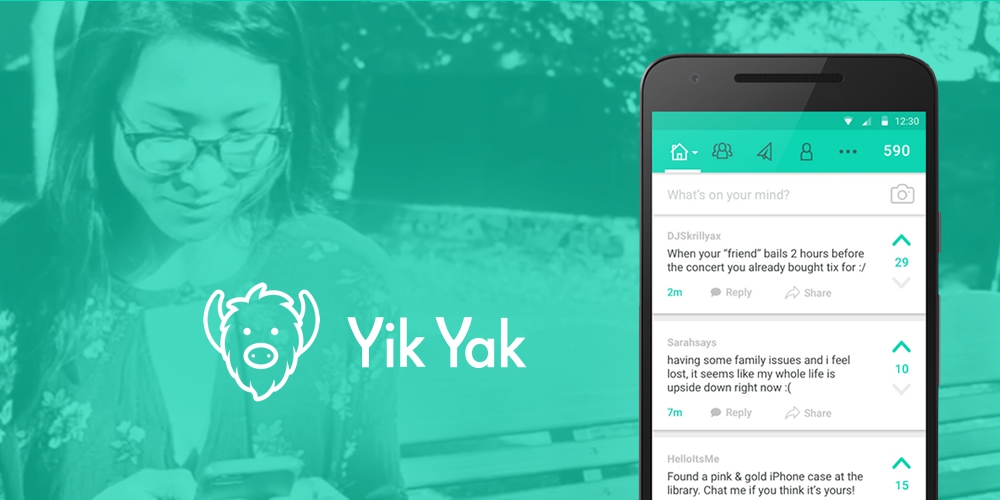Yik Yak as a Therapist and as a Friend
By Catherine Krol, Jun 3rd 2016

The Social Networking industry is one of the most archetypal examples of free-market competition. Every year kick-starter apps are developed in garage-offices, dorms, and spit out mercilessly by the hugely dynamic tech market. Its very nature is volatile because the users control the success of each app based on their own preferences, which can be difficult to predict. The ones who break through anonymity become wildly successful as their applications lift off and snowball into a name known in daily language.
This story revolves around Yik Yak, an anonymous posting social media site that uses a user's location to display all posts from a 2.5 mile radius. Yik Yak is an idea that has been considered before, but not in quite such detail. There are other similar anonymous apps such as Whisper and Secret. Yik Yak, however, has recently been dominating this niche in the Social Networking market. This app allows people to freely post what they think, without having to attach their name and reputation to it. The result is an unfiltered conversation between people in a thread-styled format.
Now, there are several ways one could rate Yik Yak. Firstly, people become much bolder when they are given the guise of anonymity so “Trolling” becomes a much more common sight in the internet world. There have been bomb threats posted on a few Yik Yak local groups, which has caused some controversial discussions about the ethical implications of Yik Yak's format. The creators of the app are in the process of securing these local chats from negative effects such as that and for the moment, Yik Yak is advertised as an app for college students and older. The reason for this is that there can be insulting things spread on the app in particular and, for a few minutes, others have to be exposed to that negativity. Until they don't. Yik Yak has an Upvote/Downvote option that once any post receives fewer than 4 downvotes, gets voted off the main page. Those who deem a comment inappropriate, have the ability to use their internet “voice” to see it doesn't get reinforced by the internet. In some ways, one could consider Yik Yak's function as a form of therapy. Those who have issues that they wouldn't feel comfortable sharing with people in their social groups can anonymously post and hear the truthful opinions of those who either share the same issues or attempt to aid the original poster (OP). In my experience, this community has character that is similar in some smaller communities of the popular social media site Reddit in that people have more genuine conversations.
Another positive effect of having a community to voice your opinions in anonymity is that contentious issues that are usually one-sided in a vocal discussion can be further explored and in theory, both sides could share their opinions and have a dialogue going. For those in a toxic environment with people who all seem to amplify their similar views with each other, this possibility is a godsend.
Overall, anonymity on the internet can lead to various results, some rather negative and some possibly beneficial. This app provides constant communication and updates in a small area that is usually the size of a school or a workplace, where most people tend to have relationships with each other outside of social media. Therefore, the ripple effect is small enough to only affect those you already know in some real-life situation. Yik Yak, though controversial, is an intriguing innovation that has impacted many people, provided great entertainment and has even benefited the lives of introverts in need of a space to breathe. We recommend to social media users that they take a peek at this rare method of social networking, as participation in it is an experience in and of itself.
Get started for free